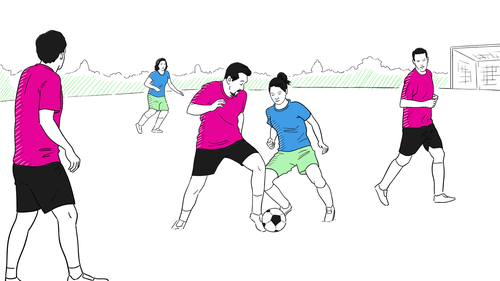Emotional Health and Wellness

How Emotional Wellness Affects Your Life
Emotions are what we feel. You may feel positive feelings, like happiness and excitement, and negative emotions, like sadness, worry, or stress. Feelings can affect the way you think, your relationships, your day-to-day activities, and health.
Relationships: When people struggle with their feelings, it's harder to understand how others feel and resolve conflicts. Feeling emotionally well can help you manage disagreements calmly, whether with friends, with family, or at work or school.
Memory and Decision Making: When coping with stress and emotional challenges, you might think too much, leaving you distracted and unable to concentrate or make decisions. For example, you may notice yourself forgetting things, such as pots on the stove or important appointments.
Physical Health: Your emotional wellness and physical health are connected. Emotional difficulties can lead to physical changes, like getting sick or losing sleep. Staying aware of your emotions and physical sensations as you work through difficult challenges is important.
Taking Care of Your Emotional Health
Everyone has experiences that affect emotional health and wellness. These experiences can be positive, like receiving a job promotion, or negative, like getting sick. Here are some ways that you can take care of your emotional health:
Be mindful. Being mindful can help you stay calm, handle stress, and feel more in control of your thoughts and feelings. For example, you can focus on your breathing or what you're doing, instead of letting your mind wander.
Find balance. Setting aside time for things you enjoy, like hobbies, prayer, or meditation can help take care of your emotional health.
Connect with others. Sharing your feelings with friends or family can help you better understand your feelings and emotions.
Manage stress. Stress can affect both your body and mind. Following a routine, getting enough sleep, eating mindfully with plenty of fruits and vegetables, and moving your body are a few ways you can manage short-term and long-term stress.
When to Seek Emotional Support
Everyone experiences and manages emotions differently. For example, someone may experience positive emotions when they start a new job, while another person may feel worried. Consider seeking support if you experience any of the following symptoms for several weeks:
- Finding it hard to do regular tasks, like taking care of yourself or your family. For example, struggling with cooking simple dishes or eating regularly.
- Sleeping very little or sleeping a lot.
- Feeling sad or worried for most of the day.
- Feeling angry or irritable, or having angry outbursts.
- Noticing changes in behavior at work, school, or in your relationships. For example, you might notice you are avoiding friends or family, or have difficulty remembering important tasks or appointments.


Types of Emotional Support Services
Professional support is available if you need help. Some examples of professional support include meeting with a counselor, attending a support group, or receiving medication from a doctor. To find help, talk to your primary care doctor, caseworker, or search for services in your area.
Remember that reaching out for support is normal. Everyone experiences stress, sadness, or extreme worry. Paying attention to your thoughts and feelings is important for your emotional wellness.
If you are having thoughts of ending your life, or hurting yourself or others, and are in need of immediate support, please call the 988 Suicide Crisis Line to speak with a professional. The 988 Suicide Crisis Line is available in over 240 languages. You can also text 988 in English and Spanish to reach a professional immediately.
If you call the Suicide Crisis Line, a trained counselor will answer the phone and connect you with an interpreter if needed. This counselor will keep you safe by listening to you and providing support if you feel like hurting yourself or ending your life. If the counselor feels you are in danger, they may discuss connecting you to local emergency services like 911, and police, fire, or ambulance services could come to your location to help you.
Disclaimer:
The IRC received competitive funding through the U.S. Department of Health and Human Services, Administration for Children and Families, Grant #90RB0052 and Grant #90RB0053. The project is 100% financed by federal funds. The contents of this document are solely the responsibility of the authors and do not necessarily represent the official views of the U.S. Department of Health and Human Services, Administration for Children and Families.
